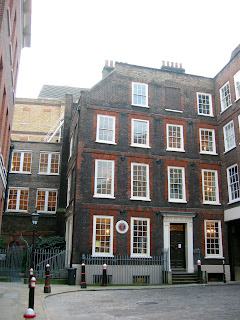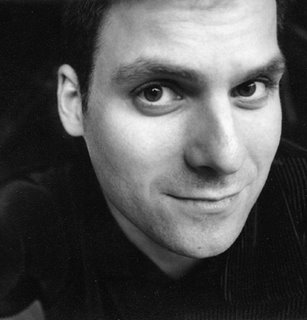Samuel Johnson's House — and His Cat Hodge
 Thursday afternoon, I had time to visit the famous London residence of Samuel Johnson, the eighteenth-century 'celebrity' after whose work this blog is named. Photos are below, but first, I've provided some information about Dr. Johnson for those of you unfamiliar with his life and works. From Wikipedia.org:
Thursday afternoon, I had time to visit the famous London residence of Samuel Johnson, the eighteenth-century 'celebrity' after whose work this blog is named. Photos are below, but first, I've provided some information about Dr. Johnson for those of you unfamiliar with his life and works. From Wikipedia.org:Samuel Johnson LL.D. [1709 – 1784], often referred to simply as Dr. Johnson, was one of England's greatest literary figures: a poet, essayist, biographer, lexicographer and often considered the finest critic of English literature. He was also a great wit and prose stylist whose bons mots are still frequently quoted in print today.
Dr. Johnson's long-time friend, Sir Joshua Reynolds, painted his portrait several times. One of them is shown above. For more about Johnson's life and work, click here. For more information about his house at Gough Square in London, click on the title of this post, or click here.
Some great quotations from Johnson are below. For more Johnson quotations, click here:
'As I know more of mankind I expect less of them, and am ready now to call a man a good man upon easier terms than I was formerly.'
'Few things are impossible to diligence and skill. Great works are performed not by strength, but perseverance.'
'Love is the wisdom of the fool and the folly of the wise.'
'Of all noises, I think music is the least disagreeable.'
'Painting consumes labour not disproportionate to its effect; but a fellow will hack half a year at a block of marble to make something in stone that hardly resembles a man. The value of statuary is owing to its difficulty. You would not value the finest head cut upon a carrot.'
'Self-confidence is the first requisite to great undertakings.'
'The world is not yet exhausted; let me see something tomorrow which I never saw before.'
'Wine makes a man more pleased with himself; I do not say that it makes him more pleasing to others.'
'Your manuscript is both good and original, but the part that is good is not original and the part that is original is not good.' (attributed to Johnson)
'It matters not how a man dies, but how he lives. The act of dying is not of importance, it lasts so short a time.'
'Mankind have a great aversion to intellectual labour; but even supposing knowledge to be easily attainable, more people would be content to be ignorant than would take even a little trouble to acquire it.'
(Click an image to enlarge)
 Samuel Johnson's House at Gough Square, London.
Samuel Johnson's House at Gough Square, London.The museum entrance is at the door on the left-hand side of the house.

 The original(?) mechanism dating from the time the house was built around 1700. All the doors are fitted with these.
The original(?) mechanism dating from the time the house was built around 1700. All the doors are fitted with these. The cabinet at the ground-floor landing of the stairwell
The cabinet at the ground-floor landing of the stairwellused for storing the candles carried to light the way.
 The main entrance to the house (not the entrance to the museum).
The main entrance to the house (not the entrance to the museum).The window above the door is barred with iron to keep thieves from lowering small children through the opening. The chain across the door is secured to a screw-shaped hook, which prevented it from being lifted off by a thief using a long stick.
 A bronze monument to Hodge, Johnson's cat,
A bronze monument to Hodge, Johnson's cat,guarding a copy of his owner's Dictionary of the English Language. Someone has dressed him for Christmas.
 James Boswell, in his Life of Samuel Johnson, wrote that Johnson loved cats, and that he bought oysters for Hodge. People leave one- and two-pence coins in the bronze Hodge's empty oyster shell. For luck? Offerings to the spirit of Johnson? Could be contributions to keep the bronze Hodge from going hungry.
James Boswell, in his Life of Samuel Johnson, wrote that Johnson loved cats, and that he bought oysters for Hodge. People leave one- and two-pence coins in the bronze Hodge's empty oyster shell. For luck? Offerings to the spirit of Johnson? Could be contributions to keep the bronze Hodge from going hungry.
 A view (somewhat out of focus!) from Fleet Street, near Johnson's house, looking toward St. Paul's Cathedral. In Johnson's day, Fleet Street was the center of the publishing industry.
A view (somewhat out of focus!) from Fleet Street, near Johnson's house, looking toward St. Paul's Cathedral. In Johnson's day, Fleet Street was the center of the publishing industry.Labels: cat, dictionary, Dr. Johnson, English language, Fleet Street, Gough Square, Hodge, London, quotation, Samuel Johnson, St. Paul's Cathedral










